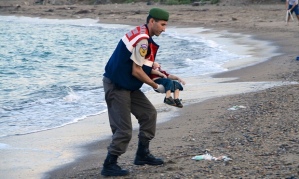Bodrum, Turkey, 2015
Source: http://www.independent.co.uk
The image of the drowned body of a three-year-old Syrian boy, washed up on the coast of Turkey’s touristic town of Bodrum, has created a momentary outrage in Turkey and abroad. Such powerful images are indeed useful to create awareness about ongoing problems among the wider public insofar as the public would like to hear about them. The danger of such a momentary reaction and outcry is that it can prevent us from seeing the bigger picture about the refugee issue today in the Euro-Mediterranean region. The images of refugee bodies washed up on Spanish, Italian, or Greek coasts have never been rare, although they are new to the public eye in Turkey. However, in the past those images did not create the momentum to engage effectively with the humanitarian disaster on the northern side of the Mediterranean. Unfortunately, it is likely that the image of the Syrian boy will be added to the other photos in the file of the shame of humanity in the 21st century.

A body of a refugee, Spanish coastline. Source: http://www.unhcr.org
Then what is the problem? The main problem is that the refugee ‘crisis’ is only remembered when such powerful images are published, or when a mass scale drowning or a killing of around 300 people in ‘one go’ occurs. The fact is that people who are on the way to protection in Europe have been dying on a daily basis not only in the Mediterranean, but also in the Sahara desert and in the shanty towns in North Africa while waiting for the next boat to Europe. What about the violence of human smugglers? Rape, killings, beatings… A quick look at the reports of NGOs will enlighten anyone about the daily humanitarian disaster on the way to seeking protection in Europe. Rather than deepening the Refugee Convention, the developed states have become examples for the rest of the world regarding how to violate it. Therefore, we as members of global human community need new counter-steps. In order to engage with the refugee crisis in the Euro-Mediterranean, I would suggest the following for the people who value human life regardless of race, skin colour, religion, nationality, and gender:
- The developed states in Europe should accept their responsibility for violating the 1951 Refugee Convention in two ways. Firstly, through legally questionable regulations such as ‘host third country’, through the militarization of the Mediterranean by FRONTEX, whose main practice has become to ‘push back’ the boats or to collect bodies from the sea, and through deferring asylum responsibility to the neighboring states in the Middle East and North Africa, the EU states have denounced their convention responsibilities. Surely they have created the precedence for countries like Turkey to treat the refugees as ‘unwanted people’. Secondly, the rhetoric of the racist right, which has been adopted by other right wing parties and so-called ‘left wing’ parties on ‘illegal migrants’, ‘economic migrants, not refugees’, ‘coming to steal our jobs’, has generated a political atmosphere that easily denounces asylum responsibilities. In such a political structure, the Convention has become a memory of the past, basically, a legacy of the Cold War when Europe needed refugees to discredit the Iron Curtain. The new refugees are not ‘useful’ for Europe after all.
- We need a new ethics. Even one death on the way to protection in Europe should be considered as a humanitarian crisis. Decriminilization of protection-seeking should go with rehumanization of the issue. Protection-seekers are not just numbers. This should be the ethics of protection of human life.
- We have to accept an uneasy fact: the Refugee Convention is rendered politically void by the developed states.
- In addition, the Convention, which has never been updated apart from the 1967 amendment, does not reflect the realities of contemporary protection seeking. It has become almost impossible to determine whether an individual is forced to leave her/his country for ‘individual political persecution’. Many individuals are forced to leave because of their membership in a particular group, even if they are not individually persecuted. Moreover, political and economic crises go hand in hand. Poverty is sometimes a stronger motivation than a bullet. I recommended the concept of ‘protection-seeker’ in my earlier work as a new legal status for refugees who do not meet the Cold War-determined criteria of the Convention. I still stand behind this new status.
- It does not matter how many detention centers are built in North Africa in particular, how long militarized borders are, or how many naval ships patrol the sea. Migration is a fact of human life. Individuals in search of protection will seek protection whatever obstacles Europe puts in front of them.
- Despite the risks, individuals take these boats. It is not because they are ‘crazy’. It is because they cannot find protection where they are.
Points 5 and 6 are particularly addressed to migration scholars. It is the responsibility of migration scholars to talk to those in power about the realities of migration, keeping in mind the political and ethical responsibility they have towards migrants, even if it risks the funding of their next project.
- Finally, racism and xenophobia have to be tackled ‘seriously’. Greece’s way of dealing with the Golden Dawn should be an example for the rest of Europe. The hijacking of politics of racist right wing has to be stopped. As European leaders know from history, the appeasement of fascism does not end well.
The body of the three-year-old boy will have a tomb. We do not know how many like him lie in the depths of the Mediterranean Sea. It is up to the good people of the world, to whom I have appealed to, to stop sending new bodies there. This is not politically easy. Nothing that matters is.
